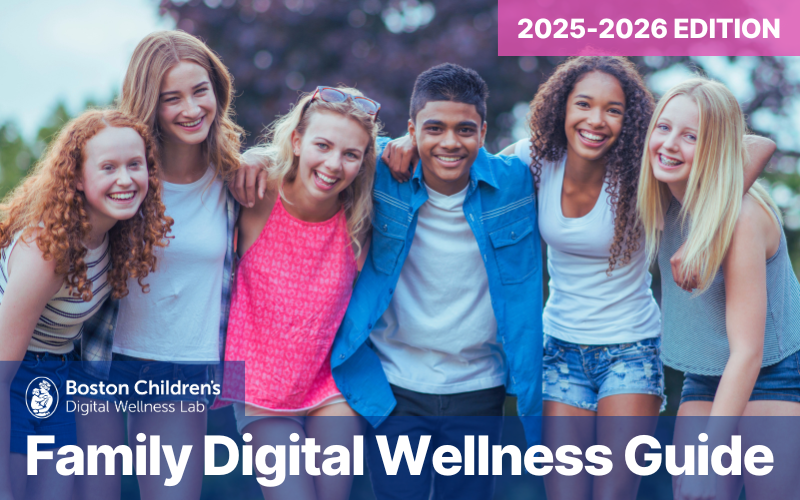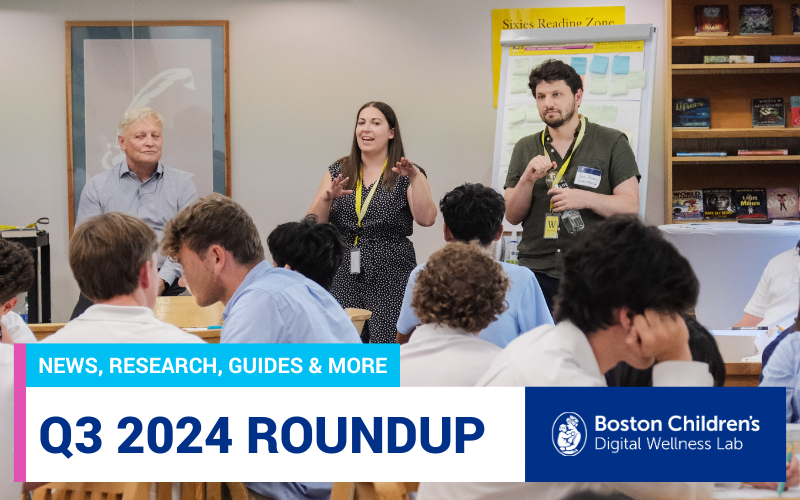Being part of conversations across the tech industry, healthcare, and policy sectors is vital to our mission at the Digital Wellness Lab, enabling us to stay at the forefront of digital wellness and safety and to advocate for the wellbeing of youth in our digital age. Please read on to learn about what we accomplished in the third quarter of 2024.
The Lab’s Q3 Highlights
- Celebrated the first year of our #InspiredInternet Pledge. Last summer, we launched the Inspired Internet Pledge with a singular goal: to unite all who work in the digital ecosystem to make the internet a safer and healthier place for everyone, especially young people. As we look back on the year, we are proud to report that we welcomed 38 signatories and advisors to the Pledge, published five resources to support the work, hosted multiple convenings to dive into the Pledge principles, and shared the Pledge around the world — from California to Saudi Arabia to Australia. Learn more about how you can be part of the change!
- Released a new white paper, Connected Play: Adolescent Gaming and Perceived Loneliness. This in-depth report — commissioned by the Ruderman Family Foundation and debuted at TwitchCon — sheds light on how social gaming affects U.S. teens (ages 13-17), particularly focusing on loneliness, toxic interactions, and the gender differences that influence gaming behaviors.
- The Lab’s Executive Director, Cori Stott, convened with Trust & Safety leaders and learned from experts about the latest developments in safety innovation and research at TrustCon in San Francisco. Important questions were discussed, such as “Do design features constitute speech?” and “How do we protect young people’s agency while keeping them safe online?”
- The Lab’s founder, Dr. Michael Rich, participated in a discussion, “Digital Safety: Clinical and Policy Dimensions,” in collaboration with the American Academy of Pediatrics (AAP) and the Society for Adolescent Health and Medicine (SAHM), in which experts discussed the complex relationship between youth and digital media, covering both its benefits and challenges. The session also highlighted critical issues related to the impact of digital technology, including recent policy developments, such as the call from the Surgeon General for social media platform warnings and legislative efforts to improve digital media transparency and safety.
- Lab Scientist Dr. Zhiying (Zoey) Yue presented two academic papers at the International Conference on Social Media & Society in London. Her presentations sparked engaging discussions and provided valuable insights into how social media shapes perceptions and communication in health contexts, showcasing the cutting-edge research being conducted in this evolving field.
- Dr. David Bickham, the Lab’s Research Director, offered his expert take on The digital lives of children: Impacts of screen time on health and play panel at the Harvard T. H. Chan School of Public Health. Participants tackled fundamental questions about whether screen time is replacing play time, or if the two can coexist.
- The Lab’s Program Administrator Brinleigh Murphy-Reuter attended MIT’s AI & Education Summit, where she learned about the commercial capabilities of AI and its impact on the future of work for today’s youth.
- Dr. Michael Rich shared insights from his 30 years of research and practice at Understanding Social Media’s Impact: Influencers, Body Image, and Substances, a webinar hosted by Operation Parent to help parents and professionals navigate the complex world of social media and its influence on young people’s physical and mental health.
- Cori Stott took part in a series of roundtable discussions with academic researchers, policy developers, and trust and safety tech professionals at the Center for Democracy and Technology’s Symposium on Child Safety Online in Washington, DC. The event focused on bridging research and policy to identify best practices and paths forward for effective online child safety in order to protect children and uphold their fundamental rights.
- The Lab’s Nicole Powell, Kaitlin Tiches, Sam Schwamm, and Dr. Michael Rich led a series of workshops at the Waterford School in Utah to support the institution’s new cell phone policy, bringing together students, faculty, and parents from grades 4-12 to engage in open and honest conversations about fostering healthy media habits and living a balanced life.
- Brinleigh Murphy-Reuter delivered a talk for the AI for Kids UX Learning Circle on the current research and key considerations regarding Generative Agents in commercial products for early childhood, exploring how these technologies intersect with early childhood development, sparking lively discussions on both the challenges and opportunities of incorporating generative agents into products for young children.
- Dr. Michael Rich spoke as part of a panel at the Snap Partner Summit, sharing with creators, influencers, and tech leads what we are learning about how to keep young people safe and well within interactive online spaces. For example, we have heard from teens and young adults that they enjoy engagement through features like “stories,” but that connecting with friends through direct messages and, even better, in person, is best for building and improving their relationships and sense of connection.
The Lab in the News
The Fractured, Surprising, and Sobering Truth About Kids and Smartphones
Dr. Michael Rich goes in depth about educating kids about the power and the drawbacks of phones in the September issue of Boston Magazine. From social media management tips for parents to debunking myths around kids and smartphones, his insights are essential reads for anyone concerned about healthy digital practices.
Kids, Screens, and Schools: How worried should we be?
Dr. Michael Rich engages in an extensive conversation with Emily Oster at ParentData about how kids are growing up increasingly intertwined with technology, and discusses how to guide families toward healthier relationships with their devices.
The Worst Feature Apple Ever Made
In this story in The Atlantic, the Lab’s Research Director Dr. David Bickham, stresses the importance of context when evaluating social media use. For example, one person might use Instagram to message with friends, whereas another might be scrolling their feed aimlessly, feeling worse about themselves.
Kids’ screen time can be a positive, pediatrician says
Dr. Michael Rich dispels common media hype, and advises a calm and reasoned approach to developing best practices regarding kids and screen media in this article at Axios.
Resources for Families
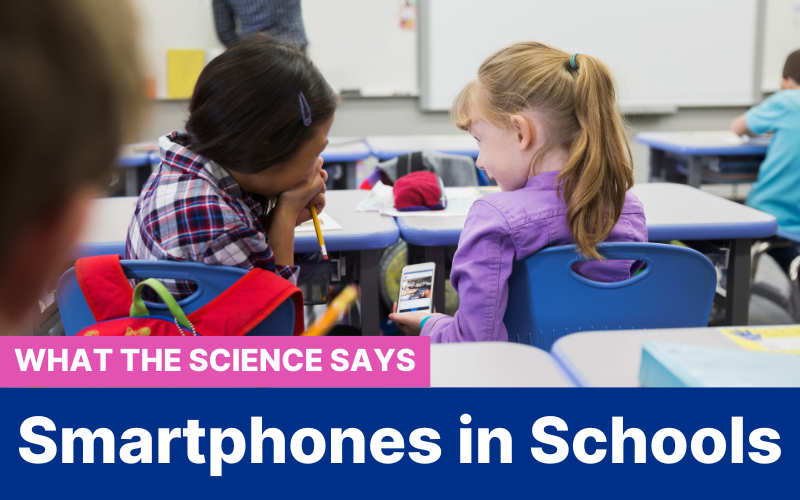
What the Science Says: Smartphones in Schools
What the research tells us about smartphone use in schools, plus some thoughts for administrators as they work to determine what’s right for their schools and districts.
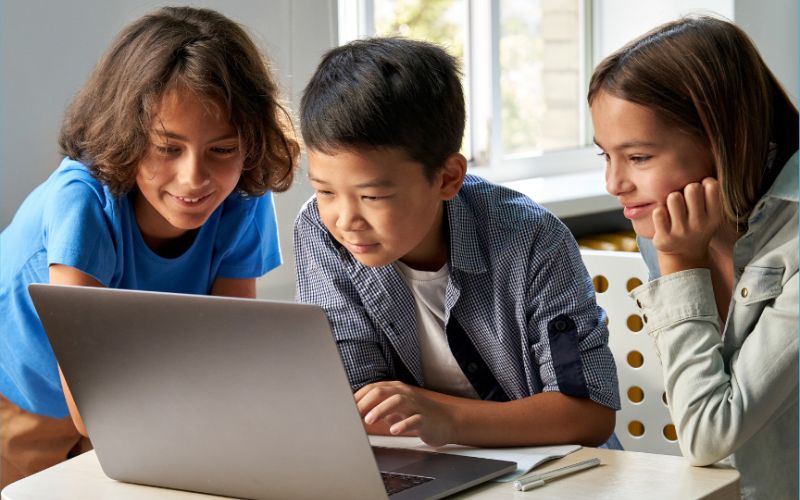
Family Guide to Going Back to School with Technology
Sharpened pencils and cool first-day outfits have always been part of the back-to-school fun, but for today’s kids, things aren’t as analog as they used to be. The COVID-19 pandemic dramatically affected how students attend school, and those effects linger even as most students return to school full-time and in-person.

Online Gen-Z Slang: Should Parents Study Up?
Geo, a member of the Lab’s 2023-24 Student Advisory Council, offers insights on the evolving dynamics of slang and how teens feel when adults attempt to use it.
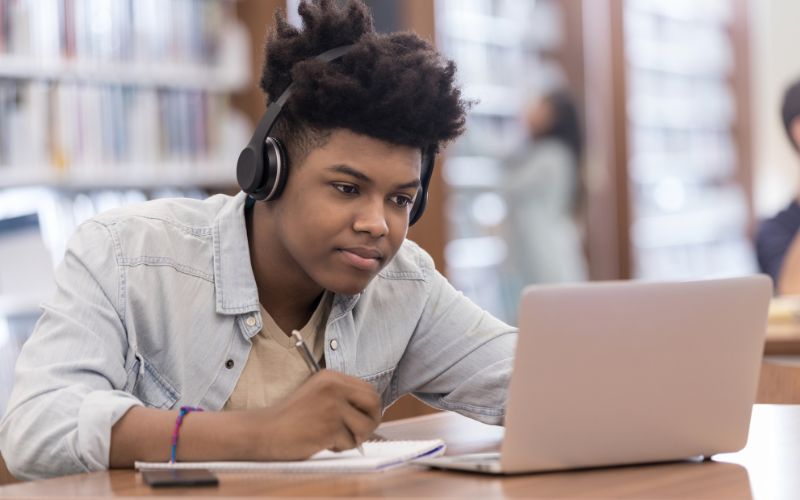
Harnessing AI for Adolescents’ Personal Growth and Development
In this post, Oluwatomilola (Tomi) Idowu, a graduate research intern at the Lab in 2023-24, discusses the impact of AI on youth personal growth and development.
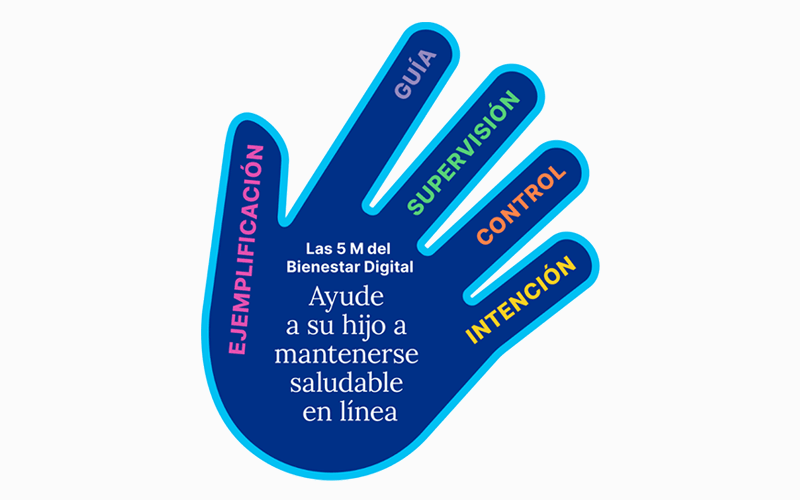
Las 5 M del Bienestar Digital
La tecnología y los medios digitales son herramientas poderosas. Y así como no le daríamos a un niño una herramienta eléctrica sin antes enseñarle cómo usarla, debemos enseñarles a usar sus dispositivos de una manera positiva y decidida que apoye su salud física, mental y socioemocional.
New Blog Series
It Takes Partnership and Shared Creativity to Design a Healthier and Safer Digital Experience
We know that no one person, organization, or company can successfully address the challenge alone, so it’s imperative that we collaborate to design and maintain a healthier digital experience for all young people and their families. Our new Fellow Travelers blog series features colleagues from around the world who focus on digital wellness from a different perspective than the Digital Wellness Lab, enabling us to share expertise in key areas of digital wellness that we don’t explore as deeply.
Read Fellow Travelers blog posts →
Want More?
To catch up on what else we’ve been up to at the Digital Wellness Lab, check out our latest blog posts and press; learn more about our work and how we create impact here; and if you haven’t already, be sure to sign up for our monthly newsletter. Interested in learning more about joining the Inspired Internet Pledge to be a part of the collaborative work to build a healthier internet? Email us at dwl@childrens.harvard.edu to connect!







